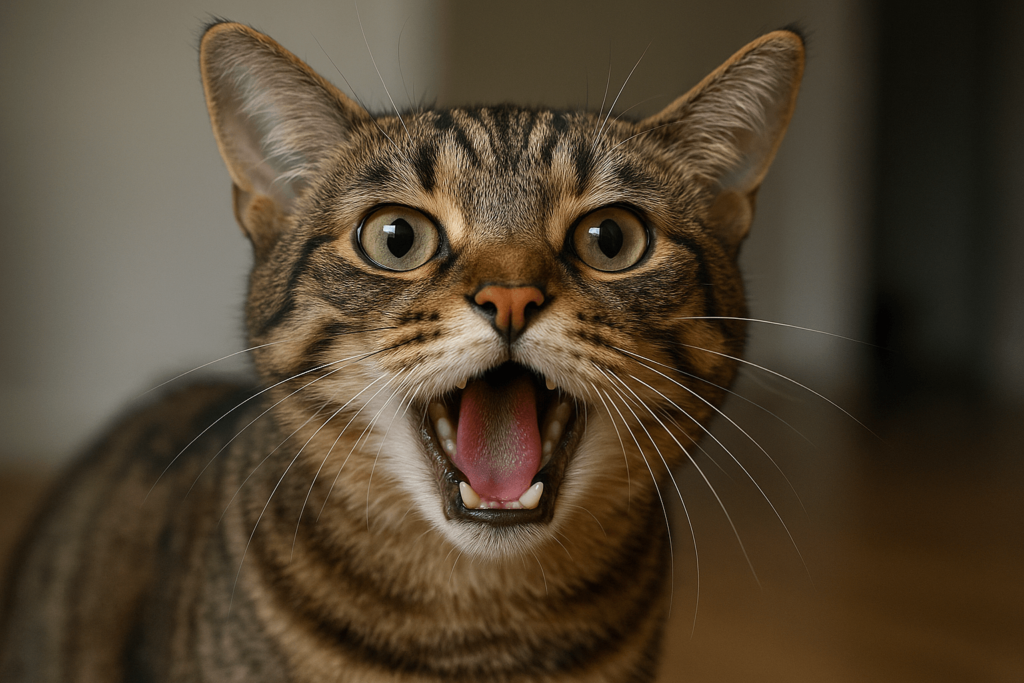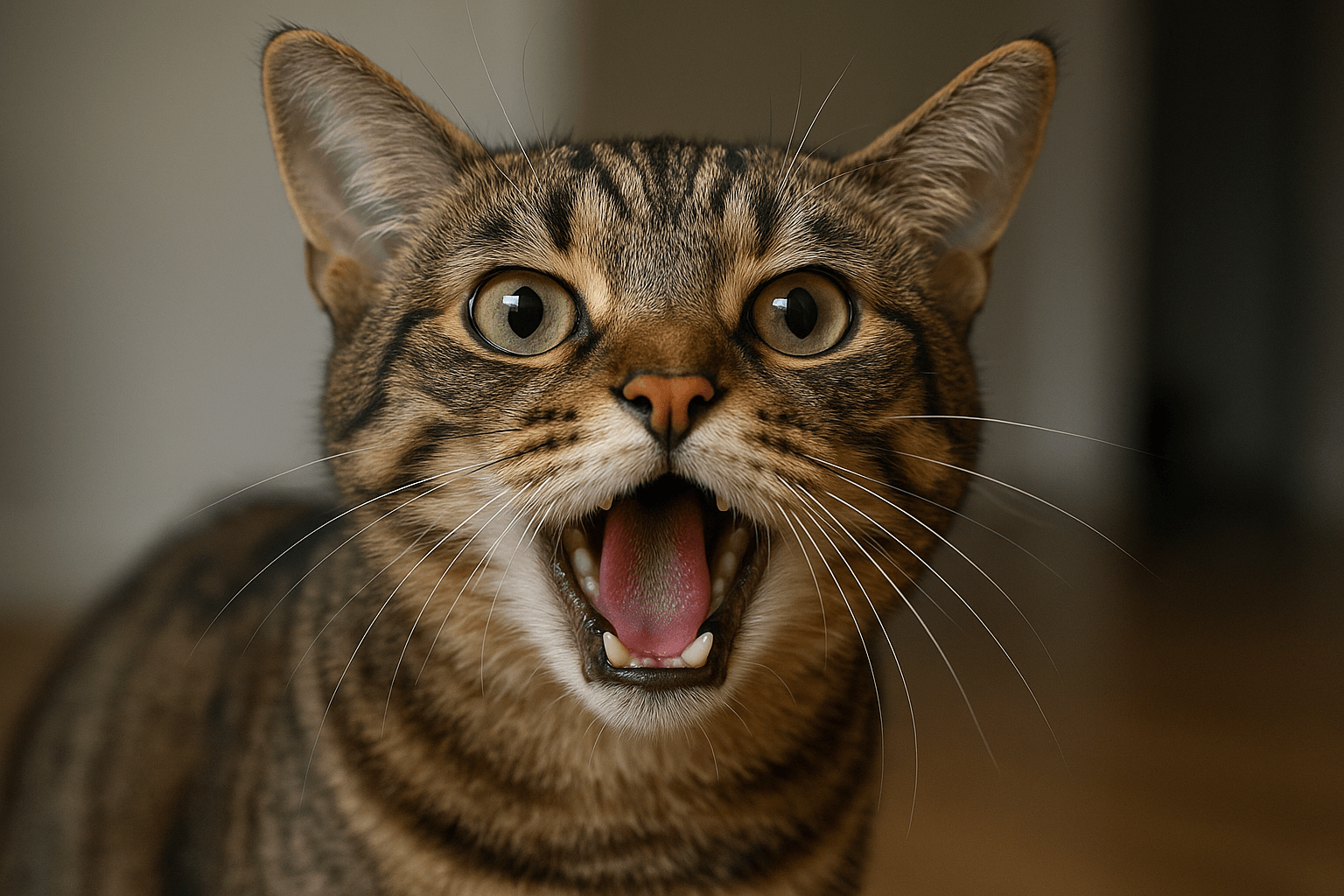Cat Meowing Differently? What Your Feline Is Trying to Tell You
Cats don’t meow just to be heard—they meow to communicate. When your cat suddenly sounds different—higher-pitched, hoarse, quieter, or more frequent—it’s not a random change. It’s a message. A shift in meowing can signal everything from excitement to illness, loneliness to pain. Ignoring it risks missing early warning signs. Understanding why your cat meows differently isn’t about decoding sounds—it’s about listening to your cat’s needs.
Why Cats Change Their Meows: The Core Reasons
A cat’s meow is a dynamic tool shaped by instinct, emotion, and physical condition. When it shifts, something inside—or around—your cat has changed. Here’s what’s likely happening:
Age-Related Changes:
As cats grow older, vocal cords weaken or stiffen, leading to softer, raspier, or less frequent meows.Pain or Discomfort:
A sudden high-pitched, sharp, or continuous meow often indicates pain—especially in joints, teeth, or internal organs.Stress or Anxiety:
Loud, repetitive, or frantic meowing can stem from environmental changes, new pets, or separation anxiety.Illness or Infection:
Respiratory infections, hyperthyroidism, or neurological issues can alter vocal quality or increase vocalization.Attention-Seeking Behavior:
Cats learn that certain meows get results—faster food, opened doors, or extra cuddles—and they refine their tone accordingly.
Your cat isn’t being dramatic. They’re adapting their communication to match their current reality. A change in meow is your first clue to what’s going on beneath the surface.

How Different Meows Translate to Needs and Emotions
Not all meows are created equal. Each variation carries a distinct meaning. Learning to distinguish them helps you respond appropriately.
Short, High-Pitched Meow:
Usually a friendly greeting—your cat is happy to see you, especially after you’ve been away.Repeated, Rapid Meowing:
This is urgent. Your cat may be hungry, trapped, or in distress—check their food bowl, litter box, or surroundings.Low, Growling Meow:
Sign of discomfort, fear, or aggression. Often paired with flattened ears or a puffed tail.Long, Drawn-Out Meow:
Often a demand—“I want food now,” “Let me out,” or “I’m bored.” This is learned behavior, refined over time.Silent Meow (Mouth Opens, No Sound):
Surprisingly common. May indicate throat irritation, fatigue, or a deliberate attempt to communicate without noise.
Recognizing these patterns turns noise into navigation. You’re not just hearing a sound—you’re reading your cat’s emotional state.
Check this guide 👉Why Does My Cat Meow With a Toy in Her Mouth? Best 7 Tips!
Check this guide 👉Why Does My Cat Meow in the Litter Box? Best 7 Tips!
Check this guide 👉Why Does My Cat Meow at Night? Best 7 Expert Tips!
| Type of Meow | Likely Meaning |
|---|---|
| Short, chirpy meow (1–2 sounds) | Friendly greeting or acknowledgment |
| Loud, persistent yowling | Urgent need: hunger, litter box, or distress |
| Low, rumbling growl-meow | Fear, pain, or territorial warning |
| High-pitched, continuous meow | Medical issue: hyperthyroidism, cognitive decline, or discomfort |
| Silent meow (mouth opens, no sound) | Throat irritation, fatigue, or intentional quiet communication |
When a Change in Meowing Signals Medical Trouble
A sudden, unexplained shift in vocalization is often the earliest—and sometimes only—sign of illness. Don’t dismiss it as “just being clingy.”
Hoarse or Raspy Meow:
Could indicate laryngitis, upper respiratory infection, or even a tumor in the throat.Excessive Meowing at Night:
Common in senior cats with cognitive dysfunction (feline dementia) or hyperthyroidism.Sudden Silence After Being Vocal:
A normally chatty cat who goes quiet may be in pain, too weak to meow, or suffering from depression.Meowing While Straining to Urinate or Defecate:
A red flag for urinary blockage or constipation—both are life-threatening emergencies.Meowing with Drooling or Pawing at Mouth:
Strong indicator of dental disease, oral ulcer, or foreign object stuck in the mouth.
If your cat’s meow changes overnight—especially if paired with lethargy, loss of appetite, or hiding—schedule a vet visit within 24 hours. Early detection saves lives.
Behavioral Meowing: Learned, Manipulative, or Attention-Seeking
Cats are brilliant learners. If a certain meow gets results, they’ll use it again—and again.
The “Feed Me Now” Meow:
A sharp, insistent, repetitive sound—often timed right before your morning coffee. This is trained behavior.The “Let Me Out” Meow:
Persistent, loud, and usually directed at doors or windows. Cats associate meowing with access.The “I’m Bored” Meow:
A plaintive, drawn-out cry that increases when ignored. Often occurs in solitary cats with low stimulation.The “Follow Me” Meow:
Soft, melodic, and accompanied by walking toward a specific spot—your cat wants you to come with them.The “I Miss You” Meow:
Occurs when you return home after being away. Often combined with rubbing, purring, and tail twitches.
These aren’t manipulative in a negative sense—they’re intelligent adaptations. The solution isn’t to ignore them, but to redirect the behavior with routine and enrichment.
How to Respond When Your Cat Meows Differently
Your reaction matters. Overreacting reinforces unwanted behavior. Underreacting ignores real distress. Here’s how to respond wisely:
Don’t Reward Demanding Meows Immediately:
If your cat meows for food at 4 a.m., wait 30 seconds before responding. This teaches them silence works better.Check Basic Needs First:
Food, water, litter box, temperature, and safety. Often, the answer is simple.Observe Body Language Alongside Meowing:
Is your cat hunched? Pacing? Avoiding touch? Combine vocal cues with posture for full context.Use Calm, Consistent Responses:
Speak softly, pet gently, and avoid yelling. Cats respond to tone as much as words.Document the Change:
Note the time, duration, pitch, and context of the new meow. This helps your vet make a faster diagnosis.
Your goal isn’t to silence your cat—it’s to understand them.
When to Call the Vet: Red Flags You Can’t Ignore
Not every meow change is urgent. But some are. Here’s when to act immediately:
New, Constant Yowling at Night:
Especially in senior cats—could signal cognitive decline or hypertension.Meowing While Straining to Urinate:
Male cats can develop life-threatening urinary blockages. This is a 24-hour emergency.Meowing with Vomiting, Diarrhea, or Lethargy:
Signs of systemic illness like kidney failure or pancreatitis.Sudden Complete Silence After Chronic Vocalization:
Could mean severe pain, neurological damage, or extreme depression.Meowing with Labored Breathing or Open-Mouth Gasping:
Indicates respiratory distress—requires immediate veterinary attention.
If you’re unsure, err on the side of caution. A simple blood test or exam can rule out serious conditions. Better safe than sorry.
Preventing Problematic Meowing Through Routine and Enrichment
Many “problem” meows stem from boredom, anxiety, or lack of structure. Prevention is always easier than correction.
Feed on a Schedule:
Use timed feeders or puzzle bowls to reduce food-related meowing.Provide Vertical Space:
Cat trees, shelves, and window perches reduce stress and give your cat a sense of control.Daily Interactive Play:
Even 10 minutes with a feather wand mimics hunting and burns off excess energy.Introduce Calming Aids:
Feliway diffusers, pheromone sprays, or calming collars help reduce anxiety-related vocalization.Avoid Reinforcing Negative Patterns:
Never give attention (even scolding) when your cat meows loudly for no reason. Wait for silence.
A calm, predictable environment leads to a quiet, content cat.
FAQ: Cat Meowing Differently
Why does my cat meow more when I’m on the phone?
Your cat interprets your focused attention as being “taken away.” They meow to regain your focus. Try giving them a toy or treat before you start calls.
Can a cat lose its voice?
Yes. Laryngitis, upper respiratory infections, or even vocal cord polyps can cause temporary or permanent voice loss. See your vet if silence persists beyond a few days.
Is it normal for a kitten to meow constantly?
Yes—especially in early weeks. Kittens meow to signal hunger, cold, or separation from their mother. As they grow, this typically decreases.
My senior cat meows all night—what’s wrong?
Common causes include cognitive dysfunction, hypertension, or pain from arthritis. Nighttime meowing in older cats should always be evaluated by a vet.
Can stress make a cat meow differently?
Absolutely. Moving, new people, loud noises, or even a changed litter brand can trigger anxious or frantic meowing.
Listen—Before It’s Too Late
A cat’s meow is their most direct line to you. When it changes, it’s not a nuisance—it’s a plea. A whisper of discomfort. A cry for help. A request for comfort.
You don’t need to understand every tone. But you do need to notice when the melody shifts.
Because the cat who once greeted you with a cheerful chirp…
…now meows in a broken, tired voice at 3 a.m.
That’s not just noise.
That’s your cat telling you, in the only way they know how:
“Something is wrong. Please see me.”
Canned Pumpkin for Cat Diarrhea: Best 7 Expert Tips! Natural remedy to firm stools, soothe upset bellies, and support gut health safely.
Can a Cat Give You Scabies? Best 7 Expert Tips! Discover the truth about feline mites, human skin risks, and how to protect yourself—without panic.
Cat Flea vs Human Flea: Best 7 Expert Tips! Discover the truth about bites, species, and how to eliminate infestations for good.
Weird Cat Behaviors: Best 7 Expert Tips! Discover why cats do strange things—and how to understand, not punish, their instincts for a happier home.





